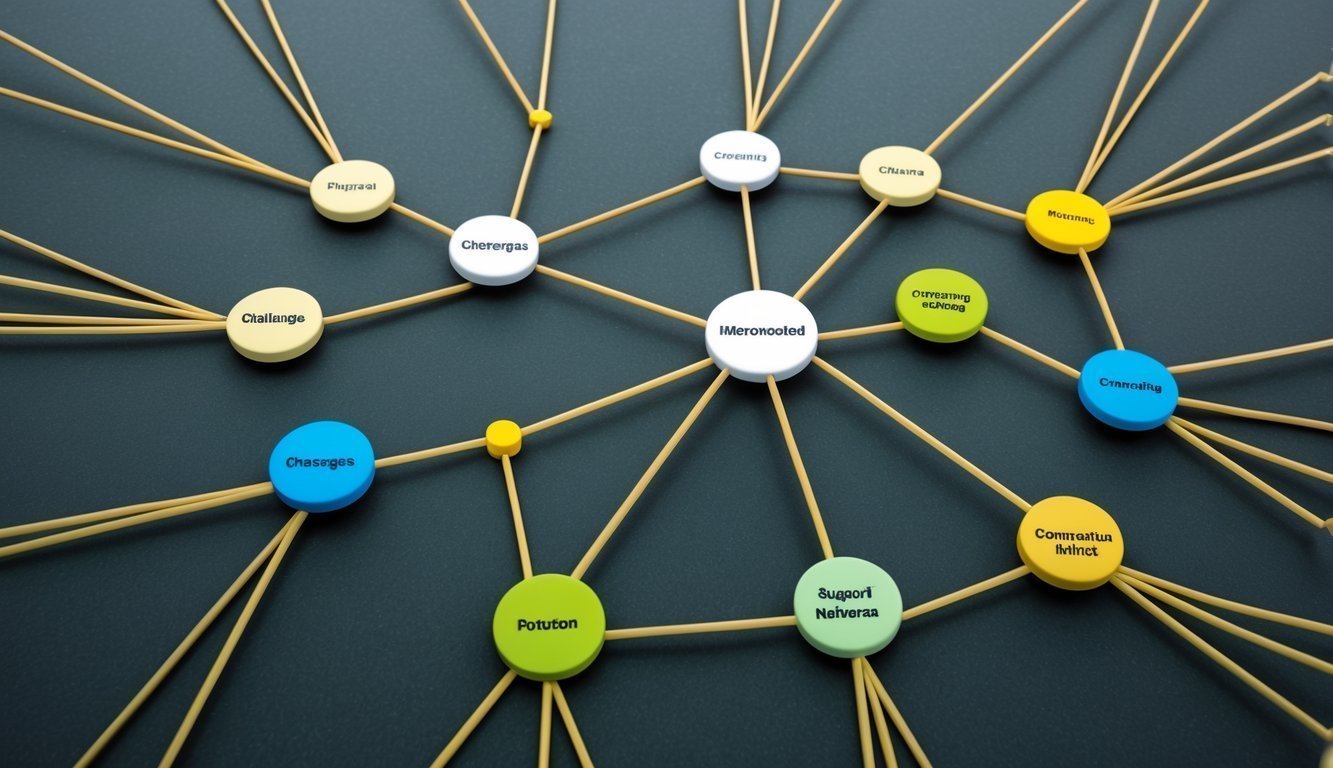PsychNewsDaily Publishers
100 Summit Drive
Burlington, MA, 01803
Telephone: (320) 349-2484
PsychNewsDaily Publishers
100 Summit Drive
Burlington, MA, 01803
Telephone: (320) 349-2484
Support networks comprise family, friends, and community members, providing emotional, practical, and informational support that enhances mental health, resilience, and overall life satisfaction.

Support networks are essential for our psychological well-being and overall life satisfaction. These interwoven relationships offer diverse forms of support, nurturing our mental health and enhancing our resilience.
A support network is made up of individuals who provide emotional, practical, or informational help in times of need. This network can encompass family, friends, colleagues, and members of the community. The significance of support networks lies in their capacity to alleviate feelings of loneliness and isolation.
Robust support networks correlate with better mental health outcomes and heightened life satisfaction. They foster a sense of belonging and assist individuals in handling stress, anxiety, and depression. Research indicates that those with strong support systems often enjoy improved physical health as well.
Moreover, support networks are crucial for personal growth and development. They facilitate opportunities for social engagement, skills enhancement, and idea exchange, which can lead to greater self-esteem and a deeper sense of purpose in life.
Social support can be classified into several categories, each serving a specific role in an individual’s life:
Emotional support is particularly vital for maintaining well-being and reducing feelings of loneliness. It encompasses having someone to confide in, share emotions with, and seek comfort from during challenging times.
Instrumental support proves invaluable during periods of illness or life changes, offering assistance with daily chores, financial help, or childcare.
Informational support aids in decision-making and problem-solving, sourced from mentors, professionals, or experienced peers who provide valuable insights.
Appraisal support helps individuals assess their situations and make informed decisions, boosting self-confidence and promoting personal growth.

Social connections are vital to our psychological health and quality of life. Strong relationships offer support, improve mental health, and contribute to overall life satisfaction.
Cultivating and sustaining relationships demands effort and intention. Effective communication is essential for nurturing strong connections. This involves active listening, showing empathy, and being attentive to others’ needs.
Individuals can fortify their social ties by participating in joint activities and spending meaningful time together. Regular check-ins with friends and family help maintain closeness, even amidst physical distance.
Establishing boundaries is vital for nurturing healthy relationships, which includes respecting others’ limits and clearly expressing one’s own needs. Skills in conflict resolution are crucial for navigating disagreements and upholding harmony in relationships.
Engaging in physical activity significantly contributes to building and maintaining social networks. Group exercise classes, team sports, and recreational activities offer chances for social engagement and shared experiences.
Regular physical activity can enhance confidence and self-esteem, making participants feel more at ease in social contexts. It also triggers the release of endorphins, which uplift mood and alleviate stress, positively influencing social interactions.
Engaging in health-oriented activities, like wellness groups or cooking classes, can foster new friendships rooted in shared interests and objectives. These connections often serve as motivation and support for maintaining healthy lifestyle habits.
Technology has revolutionized how individuals form and sustain social connections. Social media and messaging applications allow people to stay connected with friends and family across distances.
Online communities and forums connect individuals with shared interests or experiences, benefiting those with social anxiety or mobility challenges.
Video calls and virtual gatherings have gained prominence for maintaining relationships, especially during periods when in-person interactions are limited. These tools help close the gap when face-to-face meetings are unfeasible.
However, a balance between online and offline social interactions is essential; over-dependence on technology can sometimes foster feelings of isolation or lead to superficial relationships.

Social support networks are instrumental in enhancing both physical and mental health. They offer emotional reassurance, practical assistance, and invaluable resources that can considerably affect health outcomes.
Social support has a significant impact on mental well-being. Strong support networks can diminish the risk of depression and anxiety. Those with substantial social connections are likely to experience:
Emotional support from loved ones helps to mitigate stress and foster resilience. Regular social interactions stimulate the release of oxytocin, a hormone linked with bonding and reduced stress.
Individuals lacking social support are more susceptible to mental health complications. Isolation can intensify symptoms of depression and anxiety, leading to a cycle of withdrawal and declining mental health.
During health crises, the necessity of social support becomes even more apparent. The COVID-19 pandemic underscored the significance of social networks in sustaining well-being. Support systems offer:
Social support networks can affect healthcare utilization. Individuals with strong support are more inclined to seek medical assistance when necessary and adhere to treatment protocols.
Health crises generally result in increased stress and uncertainty, with social support acting as a buffer, aiding individuals in overcoming challenges while maintaining emotional stability.
Social support has tangible benefits for physical health, influencing health behaviors and physiological reactions to stress. Advantages include:
Supportive relationships encourage healthy behaviors such as regular physical activity and nutritious eating. They also dissuade harmful practices like excessive drinking or smoking.
The reduction of stress is a primary way social support positively affects physical health. Strong networks provide resources for expressing worries and seek guidance, alleviating the physiological impacts of chronic stress.

Professional support systems are vital for mental health and well-being, supplying essential resources, guidance, and assistance to individuals confronting various challenges.
Mental health professionals are fundamental to professional support systems. Psychiatrists, psychologists, and therapists offer specialized care tailored to individual requirements. They facilitate diagnosis, develop treatment plans, and provide ongoing support for mental health issues.
Therapeutic sessions offer a secure environment for clients to voice concerns and navigate their issues. Approaches such as cognitive-behavioral therapy, psychodynamic therapy, and other evidence-based methods assist individuals in crafting coping strategies and enhancing their mental health.
Healthcare providers also collaborate with other professionals as necessary, ensuring comprehensive care for complicated cases.
Professional support groups unite individuals facing similar challenges under trained facilitators’ guidance, providing a structured environment for sharing experiences and learning.
Common types of professional support groups include:
Peer support groups, often led by individuals with firsthand experience, foster a more casual environment. They nurture a sense of community and mutual understanding among participants.
Online support networks have become increasingly popular, providing continuous access to support and resources. These platforms connect individuals with peers and professionals, breaking down geographical barriers to accessing assistance.

Support networks encounter challenges that can undermine their effectiveness, necessitating focused strategies to foster connection and encourage personal development.
Social isolation and feelings of loneliness present significant threats to mental health. Support networks can alleviate these concerns by creating regular opportunities for social interaction. Virtual meetups, community gatherings, and buddy systems help sustain connections.
Promoting participation in group activities cultivates a sense of belonging. Book clubs, hobby groups, or volunteer opportunities provide shared experiences and common interests.
Support networks can establish check-in systems to ensure that members remain connected. Regular calls, texts, or home visits can help identify those at risk of isolation.
Low self-esteem can undermine the benefits of support networks; therefore, fostering self-worth is crucial for effective support.
Skills development workshops and educational initiatives empower individuals to learn new skills, enhancing confidence and promoting autonomy.
Mentorship programs connect seasoned individuals with those seeking guidance, providing both instrumental and informational support while building self-assurance.
Recognizing personal accomplishments, regardless of their scale, bolsters positive self-image. Support networks can introduce reward systems or celebratory events to honor progress.
Encouraging decision-making and problem-solving within the network fosters individual autonomy and resilience while reducing over-dependence on others.
“`